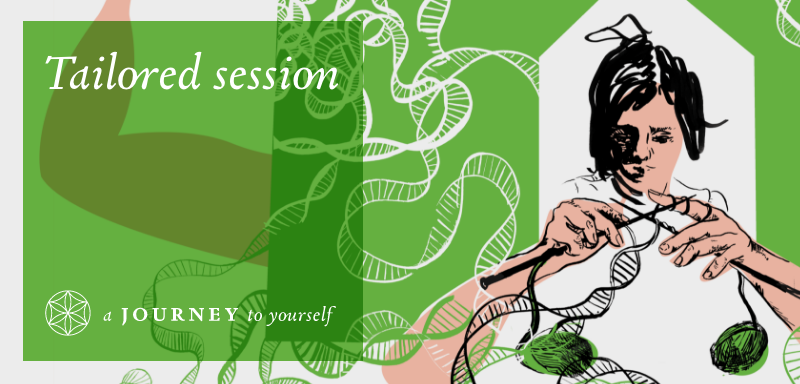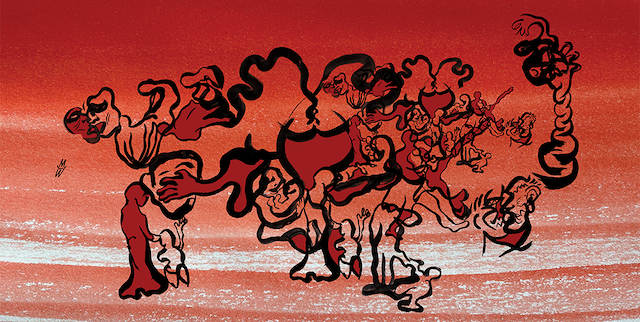As you know, it is the bond with our parents that determines our relationship with others. And the style of these bonds affects our romantic relationships. Usually, when these bonds are clearly disturbed, we realize that our relationship pattern is wrong. Often, however, the disturbances in relationships with our parents are more subtle. So we do not always notice our tendency to relationships in which we confuse love with possession, attachment with dependence, responsibility with guilt, and care with anxiety.
In this article, you will learn about the 5 symptoms of codependency, which are the difficulties:
- with correct self-esteem,
- with the determination of functional boundaries,
- in having and expressing your reality,
- with recognizing and satisfying your needs and desires,
- in experiencing and expressing your reality in moderation.
Most of us are convinced that we grew up in a “normal” family.
However, when we take a closer look at this “normal” parenting method, it turns out that they are far from normal. Often, they are the causes of our problems in adulthood, although we are not aware of them. Our relations with others are their verifier. Some of these methods can even lead to a codependency attitude. It manifests by difficulties in feeling self-worth, setting limits to functioning, experiencing one’s reality, and satisfying one’s adult needs and desires.
Some parents believe that their children must be taught some rigid rules and punish them severely for every breach of them. Others use physical and psychological violence, call children names, sleep with children, expose themselves to them. They consider it normal to ask children to discover how to cope with various difficult life situations instead of providing them with tools and techniques for solving them. Some people neglect to teach their children the basic rules of hygiene. Or believe that what children think, and feel is of little value. Others are overprotective, often living in excessively intimate relationships with their children, making them their trustees. By sharing with them intimate secrets that go beyond the level of children’s understanding.
We were all convinced that the way our parents treated us was right.
Meanwhile, most of us entered adulthood with a distorted picture of what was happening in our homes. Unaware, we blamed ourselves for not being completely happy or content with life. It seemed obvious to us that we could not please our parents by acting as we felt. It is the illusion that some abuses were normal and we were not trapped in a trap of codependency. Therefore, it is worth looking at its symptoms and their uncontrolled impact on our lives in order to recognize the symptoms and heal ourselves.
The symptoms of codependency are:
Difficulty with proper self-esteem.
Self-esteem is the inner experience of each of us. Thanks to which we see ourselves as a valuable and respectable person. It arises inside us, radiating outward and influencing our relationship to ourselves and others, and to our whole world.
Healthy self-esteem is about respecting yourself when you make a mistake, you are rejected as a lover, friend, parent, or employee.
Self-esteem that indicates co-dependency is underestimating self-worth or self-denial, or arrogance and megalomania, that is, thinking that you are someone special and better than others.
Low self-esteem arises when parents, knowingly or unconsciously, tell their children that their children are of less value than others. An arrogant attitude when the family instills the belief that the blame should be found on others. Thus, when teaching them that others are worse than them, so they should judge them and criticize them. And also, when they instill in them the belief that they are better than others, thus giving them a false sense of power. By not pointing out their mistakes, not explaining what the mistake is, not leading them to take responsibility for their own imperfection.
The lack of a healthy sense of ownership leads to the transfer of the source of one’s worth to the outside. Which we call an extrinsic sense of value. It is a sense of value based on purely external characteristics such as appearance, status, or material status, as well as the opinions and behavior of other people. Such a source is susceptible to changes that are beyond your control.
Difficulties in delineating functional boundaries.
Borders are symbolic barriers that keep other people from abusing us or us from abusing them so that we can gain a sense of who we are. They consist of an outer and an inner part.
External worship is divided into physical – that is, controlling how much you allow other people to get close to you so that they can touch you and become. It is a set distance between you and other people that allows or denies them touching you. And sexual – that is, maintaining control over sexual intercourse and touch.
If your external boundaries have not been violated, you know that before touching someone you should ask for permission. You respect their personal space, keeping their well-being in mind. Likewise for the sexual part.
The inner boundaries are the protection of your thoughts, feelings, and behaviors. Taking responsibility for them and separating them from other people’s feelings, thoughts and behavior. Not blaming others for what you think, feel, and do. This protects you from manipulating and ruling the people around you.

Symptoms of codependency.
Inviolable and flexible internal and external boundaries guarantee your intimacy and protect you from physical, sexual, emotional, intellectual, and spiritual humiliation.
In the early years of life, children have no limits and do not know how to protect themselves from being abused by others and from being abused by others. The role of their parents is therefore to protect them from being abused by others and to make them aware of their degrading behavior.
However, when parents do not fulfill this role, you may have a problem with:
- lack of boundaries – then you do not feel that someone is humiliating you or that you are humiliating someone, you cannot say “no” or you have a problem with exposing yourself to others. You allow yourself to be physically, sexually, emotionally, or intellectually abused.
- damaging them – it means that sometimes or in relation to some, you set limits and are able to take care of yourself. At other times or with other people, you are unable to draw your own boundaries. You are also partially aware of other people’s boundaries. This means that under certain circumstances or in relation to some, you may become an attacker and manipulate others.
- too large boundaries, consisting in building a wall around oneself – most often resulting from anger or fear, silence or a stream of words.
- or difficulties with defining them (from the lack of borders to “walls”) – occurs when the person hiding behind the walls opens up and becomes vulnerable. Helplessness and exposure to blows and attacks cause pain, and pain causes building walls.
We borrow border systems from our parents.
Difficulty having and expressing your reality.
To know who you are and to be able to experience yourself, you must be able to become aware of and recognize your reality, that is:
- your body – how you look (attractiveness, body size, self-care), how your body functions and works, how you experience it, and what sensations it provides.
- your thoughts – you need to know what meaning you give to the information flowing to you. You have to make sense of your beliefs.
- your feelings and emotions – you need to know your emotions, be able to recognize and name them. Be aware of your feelings.
- as well as your behavior – you need to know what you are doing or what you are not doing.
These four zones are your reality, even if they are not what others experience in a similar situation.
Dysfunction in this field consists of hiding your reality out of fear that you will not be accepted by others, or in creating your imaginary alternative reality and identity. It usually occurs when children are neglected, harassed, or rejected because of their reality. Then they learn that expressing themselves is not appropriate or safe.
Such dysfunction depending on the intensity can lead to arrogance and megalomania. This is because when you disconnect from your emotions, you may just not feel ashamed trying to stifle the overwhelming abuse of your childhood. In that case, you may be prone to harass and bully other people, and you will do so.
Difficulty recognizing and satisfying one’s needs and desires.
We all have our own needs and desires for which we are responsible. Of course, this also means asking others for help when we really need it and meeting the needs of others at the right time and under the right circumstances.
Dysfunction in this field means:
- Too much dependence – manifested by the expectation that other people will take care of their satisfaction, resulting in passivity.
- Excessive independence – manifested by failure to accept help or advice from others.
- Not feeling your needs and desires – consisting of being aware of your own needs and desires.
- Mixing your needs and desires – manifested when you know what you want and get it, but you don’t know what you need. For example, with shopaholism, you compensate for your physical tenderness, i.e. a new dress as a substitute for a hug. You indulge your cravings – gambling, compulsive sex, overeating, alcoholism, and drug addiction. Or maybe you do not feel any food needs. You feel hungry, but you don’t waste time eating or you don’t know what food you need. Also, when you take a headache pill without wondering why your head hurts. You feel sick but still, go to work without recognizing your need to rest.
Difficulties in recognizing and satisfying their needs and desires arise when parents meet all the needs and desires of their children instead of teaching them to do it themselves in the right way. A tangled parent usually doesn’t explain anything to the child and doesn’t expect anything from them. And also, when parents react aggressively to the needs and desires of their child. Dysfunctions also arise when children get what they want and get almost nothing of what they need. This is a common situation in rich families. Where parents did not meet the interactive needs of their children, such as presence, physical and emotional affection, but shower them with gifts. Such children in adulthood do not know how to take care of themselves. But they know how to get what they want most often by manipulation.

Difficulty experiencing and expressing your reality in moderation.
It is simply a lack of restraint and a tendency to extreme experiences in all spheres of reality concerning the body (nudity or baggy in clothes), thinking (black and white, bad-good), feelings (lack of feelings or over emotionality, despair-euphoria, inability to control over your feelings) and behavior (trusting everyone or not trusting everyone). The feeling that moderation is something wrong, something not enough.
These difficulties are the result of observing and reacting to the behavior of adult caregivers acting in an extreme manner. Also, treating your child in an ignorant way as someone who is not listened to and noticed. This may have resulted in meeting the child’s needs only when the child began to act in an extreme way to attract attention.
The above symptoms of codependency affect your relationship with others and with yourself.
Cause:
- negative control – that is, determining the reality of other people.
- resentment – that is, the need to repay someone or punish them for violating your self-esteem resulting from maintaining anger for the suffering they have caused you.
- disability or lack of spirituality – resulting from difficulty connecting with a power greater than you. To have a spiritual experience you must be able to share your imperfection and fallibility with others.
- avoiding reality – through addiction, physical or mental illness, to avoid confrontation with what is happening to you and with important people in your life.
- impairment of the capacity for intimacy – that is, the difficulty in revealing the truth about yourself to others and in accepting the truth about them from others without interfering with it.
A dysfunctional upbringing causes a lot of damage. Both physically like making you overweight or underweight, compromising your sexual and emotional life, and distorting your thinking and problems with spirituality.
We usually consider it normal to do what most people do. Yet many people think, feel, and act in ways that aren’t healthy at all. By losing your natural spontaneity and authenticity through the way your parents and guardians treated you in childhood, however, you begin to trust others more than yourself. However, recognizing in yourself what is the result of your parents’ wrong attitudes, you have a chance to come back to it.
Source:
Pia Mellody “Facing Codependence: What It Is, Where It Comes from, How It Sabotages Our Lives” („Toksyczne związki. Anatomia i terapia współuzależnienia.„), Czarna Owca, 2019,
Thanks to our partnership with Mindvalley, you can now learn conscious parenting from the best experts in the world.
Discover a new model of parenting Oprah called “Revolutionary” and “Life-changing” so you can create the ideal environment for your children to thrive and blossom into their most authentic self with conscious parenting expert, Dr. Shefali Tsabary
Symptoms of codependency. Symptoms of codependency.


